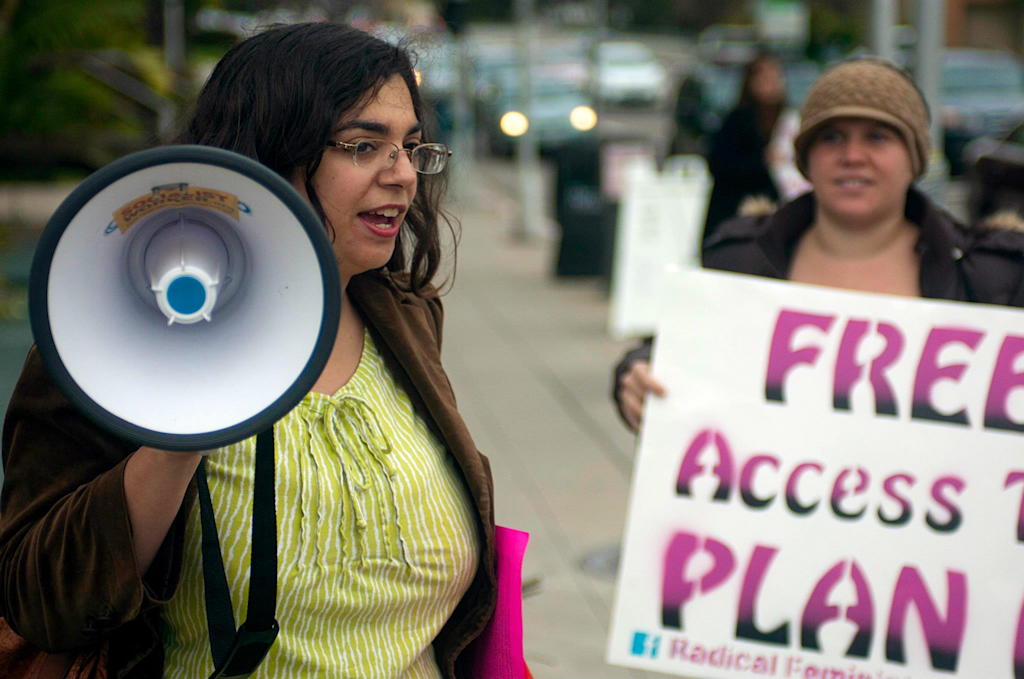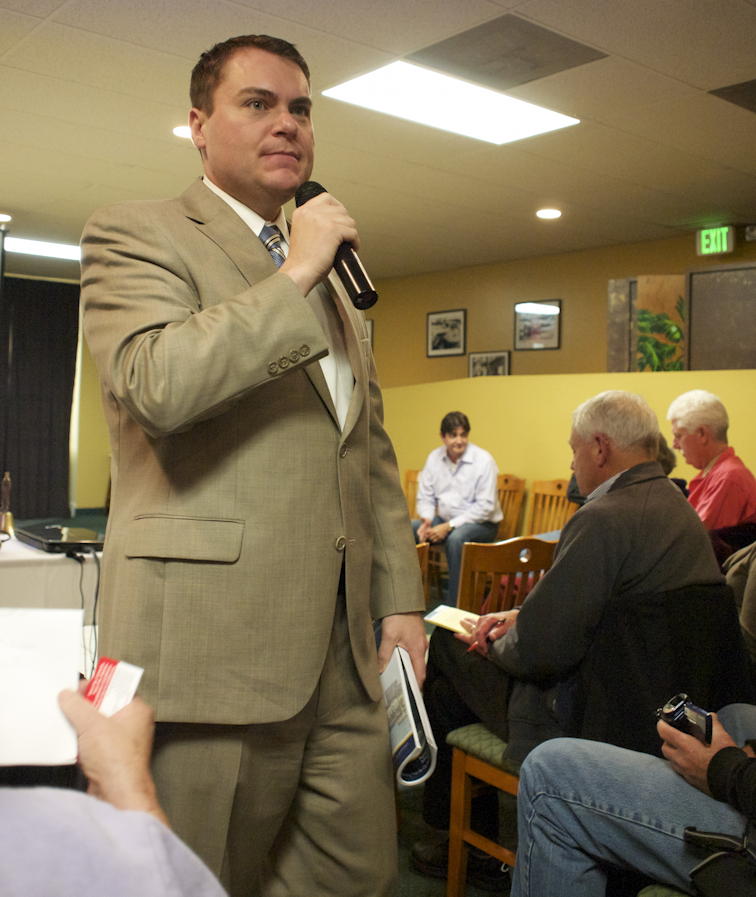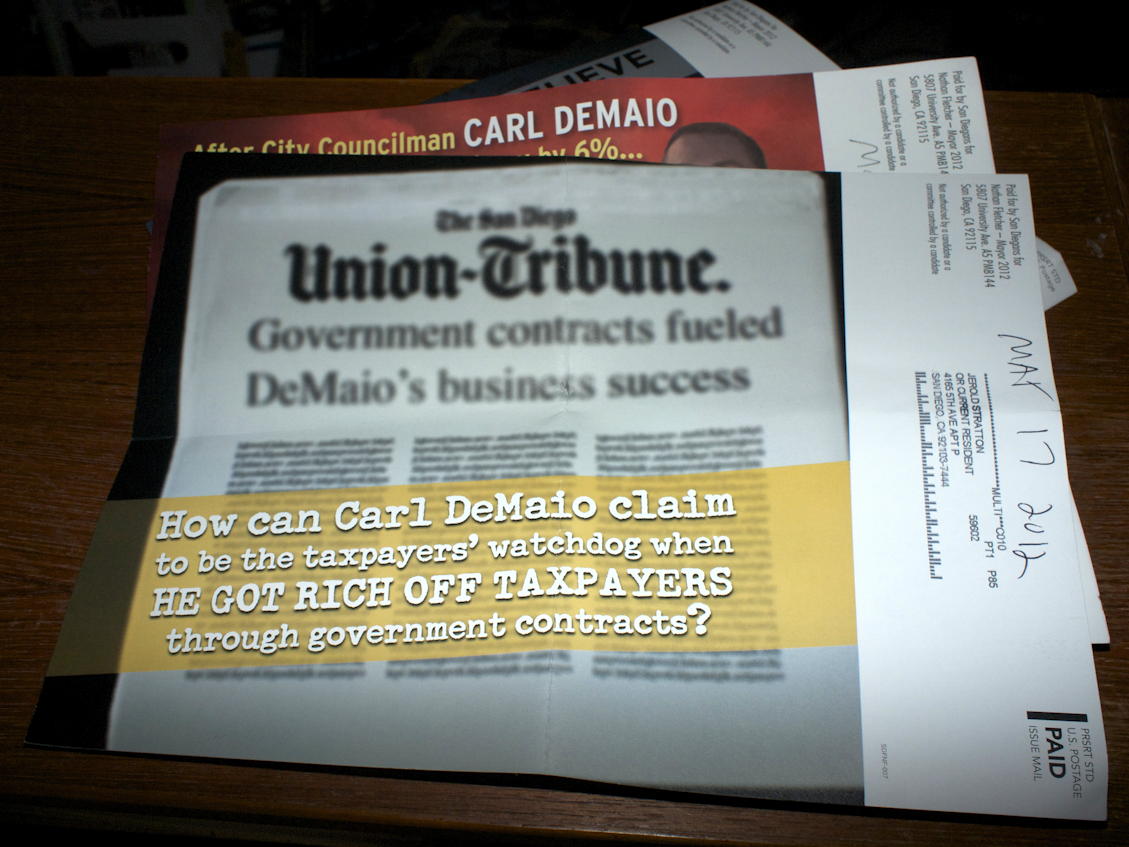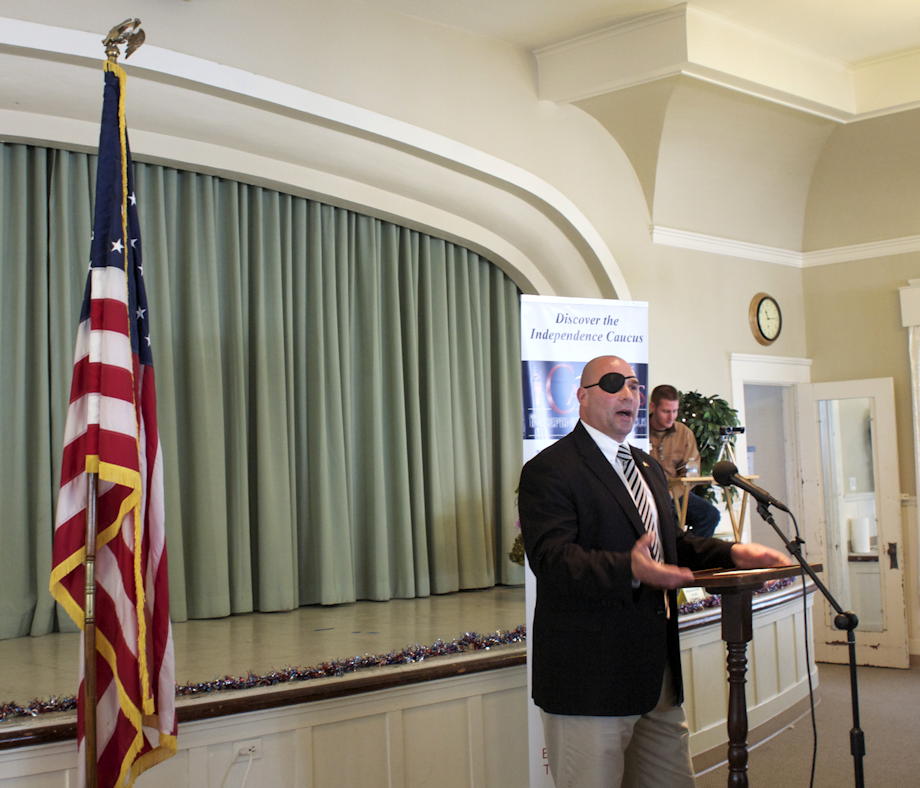California 2012
- May 30, 2012: Proposition B opponents: city salaries grow from magic beans
-
I just received a flier in the mail today from the opponents of San Diego’s Proposition B pension reform. According to the government unions (the flier was paid for mainly by the AFL-CIO), proposition B will “cost more than you think” because:
Too costly: Prop B also freezes city worker’s salaries, pulling money out of the local economy and costing San Diego’s small businesses.
This is that famed multiplier that politicians think bureaucrats add to taxes: the city taxes small businesses, pays city workers from those taxes, and then city workers take a fraction of that to buy things from small businesses. Thus, increasing taxes to increase city salaries helps small businesses.
Not taking that money from small businesses in the first place will help San Diego’s small businesses even more!
This is just another version of the broken windows fallacy: taking a portion of someone’s income and ignore what they would have done with it, counting only what the ultimate recipients will do with it, after it gets filtered through a bureaucracy.
- May 22, 2012: Ask Carl This?
-
The mayoral campaign is really heating up. Assemblyman Fletcher now has a web site, AskCarlThis, that pretends Carl DeMaio isn’t answering questions. It’s headlined “Carl won’t answer the questions”, but you can go straight to DeMaio’s web site to see the direct answers to most, if not all, of them.
The most ridiculous is the charge that DeMaio attempted to “defund the ethics commission”. Fletcher is exhibiting the typical beltway mentality here: any attempt to cut costs on a project is morally equivalent to shutting the project down.
DeMaio’s response about the “defunding”:
From 2006 to 2008, the commission’s budget increased dramatically, by over 34%. The cost savings I proposed for the Ethics Commission budget of $307,000 was actually significantly less than the $350,000 budget increase during that two-year period. The reductions were geared towards a secondary ‘education and outreach’ function of the commission’s budget, not its primary enforcement operation. As a comparison, this reduction was less than half of what I recommend for the City Council and it’s administrative ($669,400).
Over two years, it increased by $350,000; DeMaio’s proposed budget wouldn’t even have rolled it back two years. If we can’t reduce budgets without being accused of completely withdrawing support, we will never get our budget in line without continually raising taxes. This is part of what got California—and DC—into its current mess: basing every budget on the previous year’s budget, and calling any attempt to cut budgets as sacrilege. That needs to change, and it sounds like DeMaio is trying to change it.
- May 18, 2012: Nathan Fletcher, desperate politician?
-
Assemblyman Nathan Fletcher is flooding my mailbox with bad ads; he’s coming across as a typical dishonest beltway1 politician. He’s just making stuff up and throwing it at the mailbox to see if it sticks. Over the last five days I’ve received three large advertisements from his campaign misrepresenting Councilman Carl DeMaio’s record.
Yesterday’s ad asks, in screaming yellow,
How can Carl DeMaio claim to be the taxpayers’ watchdog when HE GOT RICH OFF TAXPAYERS through government contracts?
Well, off the top of my head, what if his contracts were to show public officials how to spend less of our taxes and provide better service? Does teaching public officials how to not raise taxes count as being a taxpayer watchdog? Why yes, I think it does.
Fletcher’s yellow screamer is layered atop a blurred-out Union-Tribune article, headlined “Government contracts fueled DeMaio’s business success.” But the first paragraph of that article, which Fletcher blurred out so that it can’t be read?2
The political career of City Councilman Carl DeMaio has been built on his reputation as a successful businessman who knows what it takes to make governments run better.
DeMaio, quoted in the article, adds:
“I actually built a private think tank dedicated to improving government,” he said. “That’s my life’s work. If the unions want to try to distort that, I can’t control them. They can say what they want to say, but the reality is my passion is government reform, government improvement. Translating best practices from the private sector into government to cut costs, save money and improve performance. That’s a record that’s unassailable.”
Fletcher’s yellow screamer would be a lot more accurate and a lot less useful to Fletcher if it included the full context of that article.
- May 15, 2012: Carl DeMaio’s salary
-
I was on my way out for some barbecue on Saturday and checked my mailbox. Inside was an anti-DeMaio flier in the mail from “San Diegans for Nathan Fletcher”. It said something surprising:
After voting to cut workers’ pay by 6%, City Councilman Carl DeMaio refused to cut his own pay.
The same thing is on Assemblyman Fletcher’s campaign site.
I laughed when I read it, and thought, there’s a good chance the reason DeMaio didn’t cut his pay after voting for a San Diego pay cut is that DeMaio cut his pay before the vote. When I returned from lunch, I looked it up, and it turns out that’s pretty much exactly what happened.
When he took office, before the City Council vote, DeMaio chose to cut $37,059 from his pay. He declined city contributions to his pension fund; that’s $27,459 a year. He also refused a “city automobile allowance”; that’s $9,600 a year.1
Fletcher claims that these payments don’t count as part of “his own pay”. That attitude is part of the problem and a big part of why government spending on employees has bloated enough to risk bankrupting so many cities. Businessmen know—because they’re paying it—that the money for employee benefits is part of what they pay their employees. Politicians try not to count benefits as part of spending, and they can because it doesn’t come out of their pocket.
When politicians force your employer to provide benefits, the money to cover those benefits comes out of your pay—regardless of whether the politicians refuse to let your employer say this. That $37,059 that DeMaio declined is part of what we pay councilmembers. Using the city council salary of $75,386 and those two benefits as his total pay2, he cut his pay by 33% before voting to cut city worker pay by 6%.
- May 13, 2012: Fair and open competition—closed and bitter politicians
-
I just received some political junk mail opposing San Diego’s Proposition A, the Fair and Open Competition act. They claim that “Prop A would cost San Diego hundreds of millions of dollars.”
Which makes no sense, because Proposition A not only reduces the immediate cost of city projects, it helps to cut the money laundering scheme where project money goes to government unions and then gets turned around again to fund the political campaigns of the politicians who voted for the project, so that they can vote for more expensive projects and repeat the process.
All Proposition A says is that:
- City construction projects must not be required to use Project Labor Agreements, where this doesn’t jeopardize state or federal funds. They can use PLAs if they want to, but the city can’t require them to.
- All construction contracts for more then $25,000 must be made public on the web in an easily-searchable format.
Both of those provisions are obviously good ideas, and will obviously save money. So how could the opponents of fair and open competition come up with their argument? By cheating. They got the politicians, who benefit from campaign contributions from a closed process, to rig the system. The anti-A fliers also say:
Under state law, cities such as San Diego are blocked from receiving state funds for local projects if they enact bans on project labor agreements.1
…
If Prop A passes, San Diego would no longer be eligible to receive state grants for local construction projects.
The arguments against Proposition A are a good example of why we need to end the entire concept of “public unions”, where “union leaders” negotiate with politicians who benefit, through campaign donations, from this diversion of public funds. Government unions are a money-laundering scheme for politicians to fund their campaigns with state and local money.
The state law that the fliers mention is not a pre-existing law. It was passed specifically to block Proposition A. State politicians, fearing that the money spigot might get turned off, passed Senate Bill 829 on April 12 to cut off state funds to San Diego. Proposition A actually contains an exemption for projects that would lose state funding if subject to open competition. So Senate Bill 829 forbids state funding for any project, if any other project in the city allows open competition for bids. It’s designed purely to block any competition in San Diego public projects—and to lock in that wonderful money laundering scheme.
The government union politician asks city and state politicians for more money, the city or state politician gives it to them, and then the government union politician diverts some of that money back into city and state politician’s campaign.
And when it looks like voters are onto the scam, the politicians pass laws like the anti-fair and open competition 829.
- March 17, 2012: San Diego Pro-Choice and the Meaning of Life
-

Socialist Workers? From the protest event Facebook page.
Occupy San Diego is as lazy as ever; they protested a family services organization yesterday outside of Scripps-Mercy Hospital1 here in Hillcrest for just a two-hour period. I can’t find any reporting on it except for the one announcement on the community Reader, and that didn’t even get the Facebook link right. I didn’t even see it—my girlfriend came back from a walk, asked me if I knew anything about it, and handed me the fliers they’d given her. We went by later, but they were already gone.
According to their fliers, their complaint is that a family services organization at a Catholic hospital “like all so-called crisis pregnancy centers, pregnancy centers, and pregnancy resource centers, exists to prevent women from getting abortions and accessing contraception… many pregnancy centers have intentionally misleading titles to disguise their bias against reproductive rights.”
What is the name of this insidious organization luring unsuspecting women into its clutches? Culture of Life. The flier from “The Radical Feminists of Occupy San Diego” says that “Culture of Life has a telling name…”.
Telling? You think maybe honest might be a better word? The Culture of Life web site is filled with pictures of babies, and the welcome text is “Welcome to Culture of Life Family Services! We offer quality Christ-centered medical care.” As I’m writing this today they are advertising two events, one of which is “3rd Annual Pro-Life Gala & Auction”.
The Occupy flier says that this is “an affront to women’s equality. These organizations should not be allowed to use deceptive advertising tactics.” And then complains that “The Culture of Life stocks its office with past newsletters full of articles that promote Catholicism and demonize abortion.”
- March 11, 2012: Bonnie Dumanis or Carl DeMaio?
-
Carl DeMaio: “If you can find something the city’s currently doing in the Yellow Pages…”
There’s going to be a resurgence in Yellow Pages stock if we can get a conservative into the San Diego Mayor’s office this year. Both Dumanis and DeMaio are extolling the benefits of letting our fingers do the walking to save money on city government services.
At the house meet and greet a few weeks ago, DeMaio said “If you can find something the city’s currently doing in the Yellow Pages, it may make sense to ask for bids.” At the February 20 San Diego Tea Party meeting at Andre’s, Dumanis said “If you can look it up in the Yellow Pages and you can find the same service, I think we have to look at managed competition for that.”
Like me, Dumanis carries a copy of the Constitution in her purse everywhere she goes. She got a lot of applause for that at Andre’s!
- February 7, 2012: Elizabeth Emken interview at Daily Caller
-
Alexis Levinson has an interview with Elizabeth Emken today at the Daily Caller. It sounds like she might have a chance after all.
For the first time since she was elected in 1992, more Californians do not want Democratic Sen. Dianne Feinstein re-elected than do, and her likely Republican opponent hopes to capitalize on that desire for change to oust the three-term senator.
Emken is definitely saying the right things. Her experience is as both an IBM efficiency expert and an activist in DC for autistic children. She has experience outside of government, and also experience with the legislative process, “having helped to push through legislation like the Children’s Health Act of 2000 and the Combating Autism Act of 2006.”
She says that she carried her experience with actual business projects through in the legislation she championed:
“I think what makes these bill stand out is that in these bills I put accountability mechanisms… There’s a requirement of a strategic plan, there’s a requirement for a report to congress to mark the objectives, how we’re doing in terms of the strategic plans. And there’s also sunset provisions—it says, look you have to come back and justify why would we should continue funding these programs. These are elements that I believe should be encompassed in all types of legislation,” she explained.
Read the whole thing. Should be an interesting election here in a few months. Dianne Feinstein is the epitome of the establishment Democrat, supporting spending and opposing freedom without regard for whether it’s liberal or conservative, but whether it increases the power of the federal government. She ought to be defeatable, even in California.
- February 6, 2012: Carl DeMaio in Mission Hills
-
Proposition D: “No reform. No commitment.”
I was worried I’d be one of at best a handful of people attending Carl DeMaio’s living room community coffee yesterday. The event only came up on Facebook a few days ago, and the location wasn’t in the announcement: it only came up in response to a comment an hour or two before the event. Despite that, the living room was full and people were standing in the hall.
So I’m guessing he’s as popular as the polls say he is. In September, the most recent poll I could find, 10 News interviewed him for their article on their September 2011 poll that tied him with Filner:
In 10News’ June poll, DeMaio was also in the lead. On Tuesday, he told 10News he’s not concerned about the polls or any of his opponents.
“I’m not really seeing us running against any of these other individuals. I’m running against City Hall,” DeMaio said.
That remains his strategy, judging from what he said today. He was relentless in his push for fiscal reform. While he touched on immigration and the homeless, he mostly discussed these in terms of their financial effect on San Diego—and thus on San Diego’s roads and services—as well. I was very impressed with his answers to these questions. They combined a drive to do right by people with an overall vision of increasing opportunity, reducing crime, and improving public services.
DeMaio also endorsed three candidates for city council: Ray Ellis in district 1, Mark Kersey in district 5, and Scott Sherman in district 7.
- December 23, 2011: Nick Popaditch announcement video
-
iCaucus has uploaded the video from Nick Popaditch’s announcement that he’ll run against Susan Davis to represent California’s 53rd House district in 2012.
- December 18, 2011: Nobody can beat Dianne Feinstein?
-
Nobody likes Dianne Feinstein. Not even her former campaign workers. But she almost always wins by huge margins. With voters recognizing that averting the coming financial crisis requires fiscal sanity, can the Republicans do better in 2012 against Feinstein than they did against Barbara Boxer in 2010?
Currently, the declared candidates are Elizabeth Emken, Dirk Allen Konopik, Orly Taitz, and Nachum Shifren. None of California’s familiar names are in the race yet—even Dianne Feinstein hasn’t announced, although it’s assumed that she will. Conventional wisdom is that it doesn’t matter: no matter who runs against her, the combination of incumbency and California’s left tilt will ensure that Feinstein wins.1
There are no real strong candidates running yet. Konopik2 and Taitz3 are fringe candidates. On paper, the best candidate is Elizabeth Emken. She’s a generally-likable inoffensive candidate with an emotional focus—autistic children. Her campaign page has nothing about her; searching on other pages, it appears that her degree is in economics and political science, and that her emotional focus is forcing insurance companies to cover services related to autism in children. She’s worked with establishment Republicans like Charlie Crist; she has Carly Fiorina’s email database, and she wishes she was endorsed by reformer Sarah Palin.4
Her main problem is that she hasn’t yet articulated what she’s running for. At the moment, she appears to be a single issue candidate, and while it’s an issue with some emotional appeal, it’s not something that resonates strongly in this economy. And regardless of her focus, it’s going to take extraordinarily hard work to convince California voters to vote for her over Dianne Feinstein.
- December 14, 2011: Carl DeMaio for San Diego Mayor?
-

“I’m not running on a slogan or a smile. I’m running on a specific plan that has been out for a year.”
At the San Diego Tea Party’s December meeting tonight, City Councilman Carl DeMaio reminded us that today’s pension crisis was only really a surprise to the establishment; the math was obvious.
When we started talking about the pension crisis, as a government watchdog when I started shining a light on the city of San Diego’s financial problems, what did the special interests, lobbyists, and the labor unions say? And the politicians, and a Republican mayor? What did they say in 2003?
“Pay no mind. Nothing’s wrong. It’s all good. These government pensions are fine…”
We know all too painfully what the record has been. Those pensions have run up a debt that we now have to grapple with. They’ve resulted in cuts in our services in every neighborhood. We’ve seen our roads now fall apart, and our roads are now worse than the East coast roads where they have snow and sleet.
This is clearly not a new crusade for DeMaio. In 2006, he “helped craft and sponsor” Propositions B and C, giving voters final say on pension benefit increases, and requiring competitive bidding for city functions. In 2010 he led the fight to defeat the proposed San Diego tax increase—an increase that was supported, with time and money, by other San Diego politicians including most of the city council1 and mayor Jerry Sanders, and the government unions, to the tune of half a million dollars, outspending the “no” campaign by over 50%.
He’s a major reason San Diego is now on the road to a defined contribution plan instead of the defined benefits plan that is bankrupting cities across the nation.
Remember when the mayor, the council, and the unions said “don’t be talking about that pension reform business. Because it’s all locked into contracts that we can’t change anyway, so raise your taxes, cut your services, let your roads go to pot, you can’t do anything about it, accept your fate.”
No. I’m a businessman.
I read my contracts.
And the one thing that the labor unions have learned with me… to fear… is this phrase: “Gentlemen, I have read the contract, and I’m exercising every single right of the taxpayers.”
- December 3, 2011: Nick Popaditch for House District 53
-
In the land of the blind, the one-eyed man is king. That saying’s so old even H.G. Wells skewered it, in the classic science fiction story, The Country of the Blind•. The blind seek to cure the protagonist of his affliction with sight, and their greatest doctor says that the cure is simple: remove his eyes.
“And then he will be sane?”
“Then he will be perfectly sane, and a quite admirable citizen.”
We’re going to get a test of that here in San Diego. Nick Popaditch is going to run for the House of Representatives in the 53rd district. Redistricting moved him from the 51st to my district, and I’ll be proud to vote for him. It also pits him against Susan Davis as well as against whoever else chooses to run, given the new primary rules here.
Even under normal circumstances this would not be easy. First, he would have to get through the dysfunctional party politics here; then he would have to go against Susan Davis in an area that almost never goes Republican. Since Susan Davis got redistricted back for the 2002 elections, she has never taken less than 62% of the vote. Part of that is, hopefully, that the Republicans have never run anyone of note or skill against her. The district did go, barely, to Schwarzenegger in 2006—53.4%. However, it went 57.8% to Jerry Brown in 2010.
Of course, all that is up in the air for two reasons: first, redistricting has changed nearly ever district—mostly in the Democrats’ favor; and second, we’re in a new primary system here, where, regardless of party, the top two candidates in the primaries go on to the general. If Bob Filner, who is now also in the 53rd after redistricting, were to choose to run against Susan Davis, it’s almost guaranteed that the general would be between those two Democrats. Fortunately, it looks like Filner will be trying for Mayor.1




